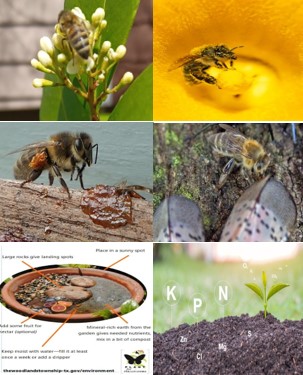Nutrition plays a significant role on Honey Bee Hive population health and expansion. If nutritional requirements are not met the cause will be a declining Honey Bee population; the effect would be:
- A declining colony that is unable to feed the young larvae, pupae and newly emerged Honey Bees.
- The Queen Bee unable to fulfill her egg laying duties,
- Opportunity for pests to overtake the hive,
- Hive stress will create an absconding event,
- Lack of hygiene allow for disease to infiltrate the hive,
- A weak or sick hive can affect adjacent apiary, influence future colony prospects.
What is honey bee nutrition
Just as humans benefit from the nutritional value of Honey, Pollen and Propolis, Honey Bees benefit from Water, Nectar, Pollen, Tree Resins and Honey Dew resources. If there are minimal resources available or the resources available produce minimal nutritional value to the Honey Bee, the effect will be (1) colony collapse, (2) absconding, (3) robbing from other colonies.
Honey provides daily carbohydrates for adult bee function. Nectar flows within an approximate area can contain carbohydrates, protein, minerals, amino acids, natural sugars.
Pollen sustains honey bees with protein nutrition collected from pollen producing flora, trees and grasses contain amino acids, lipids, vitamins, macro- and micronutrients.
- From the collection of Honey & Pollen, Bee Bread is produced by the Honey Bee as a food source during winter and emerging Honey Bees.
Tree Resin is produced by conifers due to growth or inflicted damage. When collected and returned to the hive, resin is then mixed with the honey bee salivary enzymes and beeswax. The final product is called Propolis. Propolis contains minerals & vitamins, is antimicrobial, antiviral and antifungal. All of these elements contribute to (1) colony hygiene, (2) seals the hive as added protection from the weather elements and (3) defense against predatory pests.
Honey Dew is not derived from a plant, flora or conifer but is collected from plant-sucking insect (aphids, leafhoppers, and psyllids) defecation. Honey Dew composition varies based on the source the insect is feeding on. Essentially honey dew is sweet, sticky sugar enriched with amino acids that provides a nutritious enriched carbohydrate. Some Bees may pass up nectar to get the carbohydrate rich honey dew. Honey Dew is not a reliable source for overwintering Honey Bees but is a good source of carbohydrates during a dearth.
Water is collected to help sustain the hive by mixing with pollen and honey but also with digestion in the honey bee.

